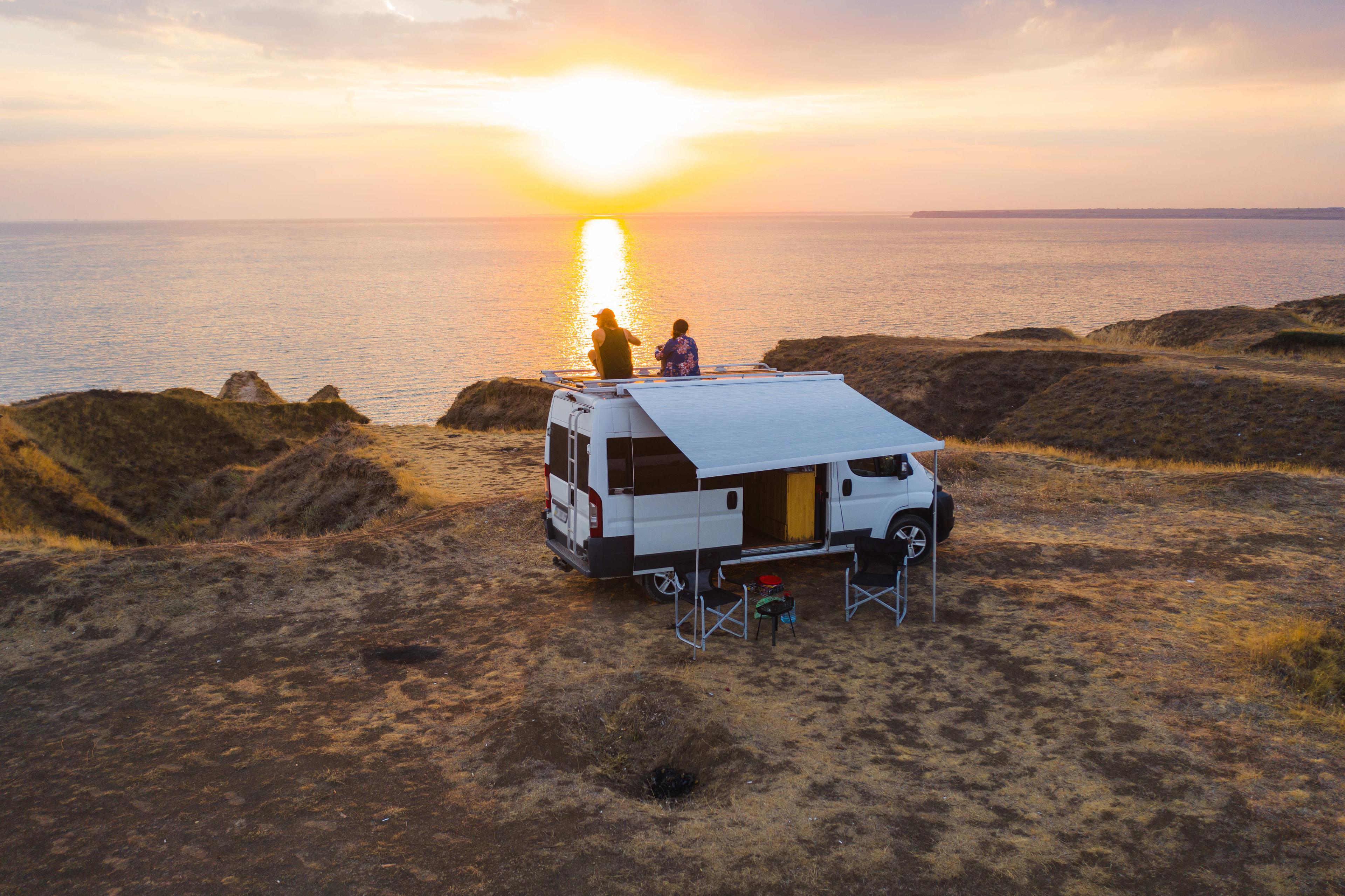Dec 30, 2021
How Much Does It Cost to Rent an RV Cross-Country?
How Much Does It Cost to Rent an RV Cross-Country?
A
By Aaron Ammar
Cross-country RV rentals cost $840- $3,500 for 2 weeks. Get the latest pricing for Class A, B, C motorhomes & trailers, plus fuel & money-saving tips.
Common questions
Blog Post
Education

Quick Answer: Renting an RV for a cross-country trip typically costs $840 to $3,500 for the rental alone, depending on the RV type and trip length. A Class C motorhome averages $180-$250 per night during peak season, while travel trailers run $60-$125 nightly. For a typical two-week coast-to-coast journey covering 3,000 miles, budget $3,000-$7,000 total when factoring in rental fees, fuel, campground stays, mileage charges, and other expenses like food and activities.
The freedom of the open road calls to you. No cramped airplane seats, no rigid hotel check-in times. Just you, the highway, and the ability to pull over whenever something catches your eye. That's the magic of a cross-country RV adventure.
But let's talk numbers. Planning your budget correctly means more money for the fun stuff and fewer surprises along the way.
What Does the Average RV Rental Cost Per Night?
Nightly RV rental rates range from $60 for basic travel trailers to $350 for luxury Class A motorhomes, with the most popular Class C models averaging $180-$250 during peak summer months.
The average nightly rate across all RV types is $184. That's your baseline. But here's where it gets interesting: the type of RV you choose dramatically changes your costs.
Class A motorhomes are the luxury tour buses of the RV world. Think full kitchens, spacious bathrooms, and room to walk around. The rent could range from $200 to $350 per night during peak season.
Class C motorhomes hit the sweet spot for families. They sleep 5-7 people and include that signature overhead cab bunk. You'll pay $180-$250 per night, making them the most popular choice for cross-country trips.
Travel trailers offer budget-friendly flexibility since you tow them with your own vehicle. This could range from $60-$125 nightly, though you'll need a capable tow vehicle.
Pop-up campers come in cheapest at $50-$80 per night. It's perfect for adventurers who prioritize experience over amenities.
Pro tip: Booking 2-3 months ahead locks in better rates and guarantees availability, especially for summer travel when demand spikes.
How Does Trip Length Impact Your Total Rental Cost?
Longer trips unlock significant per-night discounts, with weekly rentals typically saving you 10-20% and monthly rentals cutting costs by 30-50% compared to daily rates.
Let's break down real numbers. Say you're renting a Class C motorhome at $200 per night:
- Weekend trip (3 nights): $600 base rental
- One-week trip (7 nights): $1,260-$1,400 ($180-$200/night with weekly discount)
- Two-week cross-country (14 nights): $2,240-$2,520 ($160-$180/night)
- One-month adventure (30 nights): $4,200-$4,800 ($140-$160/night)
Most rental companies reward commitment with better pricing. However, peak summer pricing (June through August) runs 25-50% higher than off-season rates.
The math gets even better if you travel during shoulder season (April-May or September-October). You'll save money and skip the crowds at popular destinations.
What Hidden Costs Should You Budget For?
Beyond the base rental rate, expect additional costs including mileage fees ($0.35-$0.50 per mile), generator usage ($3-$4 per hour), insurance ($15-$50 daily), cleaning fees ($50-$150), and delivery charges ($150-$200 if applicable).
Here's what catches first-timers off guard: that advertised nightly rate rarely tells the full story. Smart planning means accounting for these extras upfront:
- Mileage: Most rentals include 100-150 free miles per day. After that, you'll pay $0.35-$0.50 per mile. For a 3,000-mile cross-country journey over two weeks, that's potentially $300-$500 in overage charges.
- Generator use adds up: Running the AC during hot summer days or powering appliances off the grid costs $3-$4 per hour. You can budget $100-$200 for a two-week trip with moderate usage.
- Insurance is non-negotiable: Your auto insurance typically does not cover a rental RV. Expect to pay $15-$50 daily for proper coverage. Some credit cards offer rental coverage, so check before buying redundant protection.
- Kitchen and bedding kits: They run into $75-$100 total if you don't bring your own. Many renters find this convenience fee worthwhile versus packing everything from home.
How Much Should You Budget for Fuel and Campgrounds?
Fuel costs typically range from $600-$1,200 for a cross-country trip, while campground fees average $25-$80 nightly, adding $350-$1,100 to your two-week budget.
Fuel efficiency varies wildly by RV class. Class A motorhomes get 8-10 MPG, Class C models achieve 10-14 MPG, and travel trailers depend on your tow vehicle. With gas averaging $3.50-$4.00 per gallon nationally, a 3,000-mile trip in a Class C (12 MPG) costs approximately $875-$1,000.
Campground pricing depends on amenities and location. National park campgrounds cost $25-$45 per night, private RV parks with full hookups run $45-$80, and dispersed camping on Bureau of Land Management or National Forest land is often free.
Smart travelers mix accommodation types. They splurge on full-hookup sites every few nights for showers and laundry, then save money with free dispersed camping between destinations.
What's the Total Budget for a Two-Week Cross-Country RV Trip?
You should plan to spend $3,000-$7,000 total for a two-week cross-country adventure, including rental ($1,400-$2,000), fuel ($600-$1,200), campgrounds ($350-$700), mileage fees ($300-$500), and food/activities ($850-$2,600).
Let's put it all together with a realistic budget for a family of four doing a New York to Seattle trip (2,850 miles, 14 nights) in a Class C motorhome:
Essential costs:
- RV rental (14 nights at $170/night): $2,380
- Mileage fees (850 miles over allowance): $340
- Fuel (2,850 miles at 12 MPG, $3.75/gallon): $890
- Campgrounds (mix of paid and free): $525
- Generator use: $125
- Insurance and fees: $420
Your adventure budget:
- Groceries and meals: $700
- Activities and attractions: $400
- Emergency buffer: $300
Grand total: $6,080
If you want to trim the costs of travel in September instead of July, choose a smaller Class B campervan, cook most meals yourself, and embrace free camping. You could reduce this budget to $4,000-$4,500.
The RV Industry Association reports that 60% of travelers planned RV trips in 2025, up from 57% in 2023. The demand proves one thing: people recognize the value. An RV trip beats flying and hotels when you calculate the total cost of the experience.
How Can You Save Money on Your RV Rental?
It's best to book 2-3 months early for 15-20% savings, travel during shoulder season (April-May, September-October) for 25% lower rates, consider peer-to-peer rentals, and choose delivery to save on pickup fees and insurance costs.
The rental market has evolved. Platforms like Outdoorsy connect you directly with RV owners, often at better rates than traditional rental companies. Here are a few money-saving strategies that actually work.
First, flexibility wins. Mid-week pickups and returns cost less than weekends. If you avoid July and August, you can save 25-40% on nightly rates.
Second, consider one-way relocation deals. Rental companies need vehicles moved between locations and offer steep discounts. You might score a California-to-Texas trip for half price.
Third, negotiate add-ons. Many owners waive cleaning fees if you return the RV clean. Also, ask about discounts for longer rentals or return customers.
Fourth, join loyalty programs. It eliminates the stress of driving and saves money when you factor in reduced insurance costs and pickup fees.
Hit the Road with Confidence
Cross-country RV travel offers unmatched freedom and adventure. With realistic budgeting and smart planning, you'll spend more time enjoying America's landscapes and less time worrying about costs.
Remember: the cheapest option isn't always the best value. Choose an RV that fits your needs, book strategically, and budget for the full experience, including fuel, campgrounds, and activities.
Whether you're renting or already own an RV, proper insurance keeps your trip on track. Roamly offers specialized RV rental insurance that understands the adventure lifestyle because we live it too. Get your free RV insurance quote from Roamly right away.
November through March offers the deepest discounts (30-50% off peak rates), though weather limits destination options. Shoulder seasons (April-May and September-October) offer a balance of good weather with 15-25% savings.
Yes. Your standard auto insurance typically doesn't cover RV rentals. Most rental companies offer insurance packages for $15-$50 daily, or check if your credit card provides rental coverage.
For groups of 3-4 people, an RV typically costs less than hotels plus a rental car when you factor in accommodation, transportation, and the ability to cook meals. Solo travelers or couples might find hotels more economical.
It's advisable to book 2-3 months ahead for the best selection and rates. Because last-minute bookings (within 2 weeks) may result in limited availability and premium pricing, especially during the summer.
Base rental includes the vehicle and typically 100-150 free miles per day. Extra costs include mileage overage, generator use, kitchen/bedding kits, cleaning fees, insurance, and dump fees.
Roamly Insurance Group, LLC ("Roamly") is a licensed general agent for affiliated and non-affiliated insurance companies. Roamly is licensed as an agency in all states in which products are offered. Roamly license numbers. Availability and qualification for coverage, terms, rates, and discounts may vary by jurisdiction. We do not in any way imply that the materials on the site or products are available in jurisdictions in which we are not licensed to do business or that we are soliciting business in any such jurisdiction. Coverage under your insurance policy is subject to the terms and conditions of that policy and is ultimately the decision of the buyer.
Policies provided by Roamly are underwritten by Spinnaker Insurance Company, Progressive Insurance Company, Safeco Insurance Company, Foremost Insurance Company, National General Insurance, Mobilitas Insurance Company, and others.
Connect
© 2025 Roamly All rights reserved.
